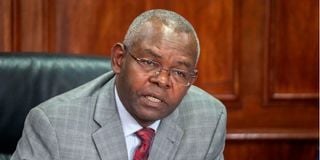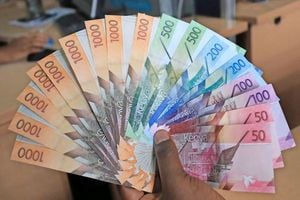
Central Bank of Kenya Governor Kamau Thugge.
Central Bank of Kenya (CBK) Governor Kamau Thugge has been summoned by Parliament to provide details on a contract signed with an undisclosed German firm to print the country’s new bank notes.
The National Assembly’s Finance and National Planning wants the CBK boss to shed light on the name of the German firm, how the tender was awarded, and the amount the deal will cost the taxpayer to print the new currency.
The committee chaired by Molo Thuggery MP Kuria Kimani has opened a probe following CBK’s revelation that a German firm had been hired to print new notes.
“We will be meeting the Central Bank of Kenya Governor Kamau Thugge over reports that a firm has been identified to print new bank notes,” Mr Kimani said about a directive to Dr Thugge to appear before it the Parliamentary committee on Tuesday next week.
“I ask you members to be present on that day. I know we will be in recess but we need to know the details of this currency printing deal.”
Dr Thugge last week revealed that Kenya had tapped the services of a German firm for the printing of new notes, months after allowing the local subsidiary of British printer De La Rue –in which it owns a 40 percent stake— to shut down for lack of new orders.
He, however, did not provide details on the name of the firm, how the tendering was done, and how much will be spent on the deal. The government did not explain whether the new printer was sourced through competitive or direct procurement.
Dr Thugge disclosed the new printer while fielding questions from the media during the post-monetary policy committee meeting.
The Governor only told the media that the printing was being done by “one of the best firms” in Germany.
“The notes we have are getting old and therefore we need to get new notes. The reason why we started with Sh1,000 notes is that we are projecting there could be a stockout of those notes in July or August and so it was really necessary that we get new notes as quickly as possible,” he said.
The notes will bear the signature of Dr Thugge and Treasury Principal Secretary Chris Kiptoo. They will have the year of print as 2024 and will bear new security threads with colour-changing effects that are specific to each denomination. CBK said the rest of the features remain the same as those of the series issued in 2019.
The new German printer is taking over the multi-billion shillings currency printing deal after De La Rue Kenya EPZ Limited, a notes printing firm in which Kenya purchased a 40 percent stake for £5 million (Sh820.5 million) in 2019, shut its plant in Nairobi and wound down operations 19 months ago.
Germany has two prominent currency printers –Bundesdruckerei GmbH and Giesecke+Devrient GmbH— and it is not clear if either of the firms is the one that has been awarded a new contract to print notes for Kenya.
Giesecke+Devrient is one of the firms that in 2018 lost to De La Rue the bid to print Kenya’s new generation notes.
De La Rue wound up its currency printing operations in Kenya in the financial year that ended March 2023 and spent £15.1 million (Sh2.48 billion) to lay off more than 300 workers, pay lawyers, and write off its assets.
De La Rue’s exit marked an abrupt change of fortune for a firm that in late 2018 won an £85 million (Sh13.9 billion) three-year tender to design and manufacture Kenya’s new currency generation notes.
CBK disclosures show that currency production costs, which include ordering, printing, minting, freight, insurance, and handling expenses amounted to Sh12.51 billion in the past five years to June 2023.
Treasury’s dividends from the joint venture were £0.8 million (Sh131.2 million) in 2020, £1.2 million (Sh196.9 million) in 2021, and £0.9 million (Sh147.7 million) in 2022 before the wind-down costs saw it take a £2.9 million (Sh475.8 million) loss last year.









